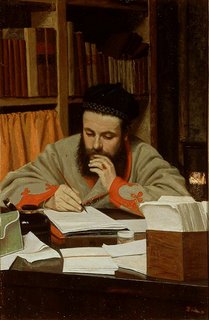 Mozart, Wolfgang Amadeus (1756-1791), Austrian composer, a centrally important composer of the Classical era, and one of the most inspired composers in the Western musical tradition.
Mozart, Wolfgang Amadeus (1756-1791), Austrian composer, a centrally important composer of the Classical era, and one of the most inspired composers in the Western musical tradition. Born on January 27, 1756, in Salzburg, and baptized Johannes Chrysostomus Wolfgangus Theophilus Mozart, he was educated by his father, Leopold Mozart, who was leader of the court orchestra of the Archbishop of Salzburg and a celebrated violinist, composer, and author.
Mozart's Musically Precocious Childhood
By the age of six Mozart had become an accomplished performer on the keyboard, violin, and organ and was highly skilled in sight-reading and improvisation. Five short piano pieces composed by Mozart when he was six years old are still frequently played. In 1762 Leopold took Wolfgang on the first of many successful concert tours through the courts of Europe. During this period Wolfgang composed sonatas for the harpsichord and violin (1763), a symphony (1764), an oratorio (Die Schuldigkeit des Ersten Gebots, 1766), and the opera buffa (Italian, "comic opera") La Finta Semplice (The Simple Pretence, 1768). In 1769 Mozart was appointed Konzertmeister to the Archbishop of Salzburg, and later in the same year, at La Scala, Milan, he was made a chevalier of the Order of the Golden Spur by the pope. He also composed his first Singspiel (a kind of light opera in German with some spoken dialogue), Bastien und Bastienne, in the same year. At the age of 14 he was commissioned to write a serious opera. This work, Mitridate, Rè di Ponto (Mithridates, King of Pontus, 1770), produced under his direction at Milan, completely established an already phenomenal reputation.
The Mozarts returned to Salzburg in 1771. Hieronymus, Count von Colloredo, the successor to the Archbishop of Salzburg, who had died while the Mozarts were touring Italy, cared little for music. Mozart's appointment at Salzburg, however, proved to be largely honorary; it allowed ample time for a prodigious musical output during his next six years, but afforded little financial security. In 1777 Mozart obtained a leave of absence for a concert tour and left with his mother for Munich.
A Difficult Later Life
The courts of Europe ignored the 21-year-old composer in his search for a more congenial and rewarding appointment. He travelled to Mannheim, then the musical centre of Europe because of its famous orchestra, in hopes of a post, and there fell in love with Aloysia Weber. Leopold promptly ordered his son and wife to Paris. His mother's death in Paris in July 1778, his rejection by Weber, and the neglect he suffered from the aristocrats whom he courted made the two years from Mozart's arrival in Paris until his return to Salzburg in 1779 one of the most difficult periods in his life.
While at home Mozart composed two masses and a number of sonatas, symphonies, serenades, divertimentos, and concertos; these works reveal for the first time a distinctive style and a completely mature understanding of musical media. The success of Mozart's Italian opera seria Idomeneo, Rè di Creta (Idomeneo, King of Crete), composed in 1781, prompted the Archbishop of Salzburg to invite Mozart to his palace at Vienna. A series of court intrigues and his exploitation at the hands of the court soon forced Mozart to leave. In a house in Vienna rented for him by friends, he hoped to sustain himself by teaching. During this period Mozart composed a Singspiel called The Abduction from the Seraglio, which was performed for Emperor Joseph II in 1782.
In the same year Mozart married Constanze Weber, Aloysia's younger sister. Unending poverty and illness harassed the family until Mozart's death. The Marriage of Figaro (1786) and Don Giovanni (1787), with librettos by Lorenzo Da Ponte, while successful in Prague, were partial failures in Vienna. From 1787 until the production of Così Fan Tutte (All Women Do So, 1790, again with a libretto by Da Ponte), Mozart received no commissions for operas. For the coronation of Emperor Leopold II in 1791 he wrote the opera seria La Clemenza di Tito (The Clemency of Titus; libretto by Metastasio). His three great symphonies of 1788-no. 39 in E-flat, no. 40 in G minor, and no. 41 in C (the Jupiter)-were never performed under his direction. While Mozart was working on the Singspiel The Magic Flute (1791, with a libretto by Emmanuel Schikaneder), an emissary of a Count Walsegg mysteriously requested a requiem mass. This work, uncompleted at Mozart's death, proved to be his last musical effort. It was completed after his death by Franz Süssmayr, one of his pupils. He died in Vienna on December 5, 1791-recent research suggests the cause was chronic kidney failure. His burial was attended by few friends. The place of his grave is unmarked. The legend that the Italian composer Antonio Salieri murdered him is unsupported by reputable scholars.
Evaluation
Mozart had an unsuccessful career and died young, but he ranks as one of the great geniuses of Western civilization. His large output (more than 600 works) shows that even as a child he possessed a thorough command of the technical resources of musical composition as well as an original imagination. His instrumental works include symphonies, divertimentos, sonatas, chamber music for a number of instrumental combinations, and concertos; his vocal works consist mainly of church music and operas. Mozart's creative method was extraordinary, for his manuscripts show that, although he made an occasional preliminary sketch of a difficult passage, he almost invariably thought out a complete work before committing it to paper. His music combines an Italian taste for clear and graceful melody with a German taste for formal and contrapuntal ingenuity. Mozart thus epitomizes the Classical style of the 18th century, the goal of which was to be succinct, clear, and well balanced while at the same time developing ideas to a point of emotionally satisfying fullness. These qualities are perhaps best expressed in his concertos, with their dramatic contrasts between a solo instrument and the orchestra, and in his operas, with their profound contrasts between different personalities reacting to changing situations. His operas achieved a new unity of vocal and instrumental writing; they are marked by subtle characterization and an unusual use of Classical symphonic style in large-scale ensembles.
Beethoven, Ludwig van (1770-1827), German composer, generally considered one of the greatest composers in the Western tradition.
Born probably on December 16, 1770, in Bonn, Beethoven was reared in stimulating, although unhappy, surroundings. His early signs of musical talent were subjected to the capricious discipline of his father, a singer in the court chapel. In 1789, because of his father's alcoholism, the young Beethoven began supporting his family as a court musician. His early compositions under the tutelage of the German composer Christian Gottlob Neefe-particularly the funeral cantata on the death (1790) of Holy Roman Emperor Joseph II-signalled an important talent, and it was planned that Beethoven study in Vienna with Wolfgang Amadeus Mozart. Although Mozart's death (1791) prevented this, Beethoven went to Vienna in 1792 and became a pupil of the Austrian composer Joseph Haydn.
In Vienna, Beethoven dazzled the aristocracy with his piano improvisations; meanwhile, he entered into increasingly favourable arrangements with Viennese music publishers. In composition he steered a middle course between the stylistic extravagance of the German composer Carl Philipp Emanuel Bach and what the public had perceived as the over-refinement of Mozart. The broadening market for published music enabled him to succeed as a freelance composer, a path that Mozart a decade earlier had found full of frustration.
In the first decade of the 19th century Beethoven renounced the sectional, loosely constructed style of works such as the popular Septet for strings and winds op. 20 (1800), and turned to a fresh expansion of the musical language bequeathed by Haydn and Mozart. Despite his exaggerated claim that "he had never learned anything from Haydn"-he had gone so far as to seek additional instruction from the German composer Johann Georg Albrechtsberger-Beethoven soon revealed his complete assimilation of the Viennese Classical style in every major instrumental genre: symphony, concerto, string quartet, and sonata. The majority of his works which are most often performed today were composed during the decade bounded by the Symphony no. 3 (Eroica, begun 1803; first performed, 1805) and the Symphony no. 8 (1812), a period known as his "heroic decade".
Beethoven's fame reached its zenith during these years, but the steadily worsening hearing impairment that he had first noted in 1798 led to an increasing sense of social isolation. Gradually Beethoven settled into a pattern of shifting residences, spending the summer in the Viennese suburbs-Heiligenstadt was a favourite choice-and moving back to the central city in the autumn. In 1802, in his celebrated "Heiligenstadt Testament", a quasi-legal letter to his two brothers, he expressed his agony over his growing deafness. After 1805 accounts of Beethoven's eccentricities multiply. He performed in public only rarely and made his last appearance in 1814.
Although reports circulated among Beethoven's friends that he was constantly in love, he tended to choose unattainable women, aristocratic or married or both. In his letter to the "Immortal Beloved" (presumably never sent and now dated at 1812), he expressed his conflicting feelings for the woman who may have been the sole person ever to reciprocate his declarations. The long-debated riddle of her identity was solved beyond reasonable doubt in 1977 by the American musicologist Maynard Solomon. She was Antonie Brentano, the wife of a Frankfurt merchant and a mother of four. Conceivably, Beethoven's sense of virtue and fear of marriage contributed to his flight from this relationship, with its deeply shattering conflicts.
In 1815, on the death of his older brother, Casper Carl, Beethoven devoted his emotional energies to a costly legal struggle with his sister-in-law for custody of her 9-year-old son Karl. The mother received a temporarily favourable ruling, and only the intervention in 1820 of Beethoven's most powerful patron, the Archduke Rudolph, won the composer custody of his nephew. Beethoven was not an ideal parent and enormous friction developed between the two, contributing to Karl's attempted suicide in 1826.
By 1818 Beethoven had become virtually deaf and relied on small "conversation books", in which visitors wrote their remarks to him. He withdrew from all but a steadily shrinking circle of friends. Except for the premières of his Symphony no. 9 and parts of the Missa solemnis in 1824, his music remained fashionable only among a small group of connoisseurs. His prestige was still such, however, that during his last illness he received huge outpourings of sympathy. He died in Vienna on March 26, 1827; tens of thousands witnessed his funeral procession.
Chopin, Frédéric François (1810-1849), Polish composer and pianist of the Romantic school, regarded by some as one of the greatest composers of piano music.
Born March 4, 1810, in Zelazowa Wola, near Warsaw, of a French father and a Polish mother, Chopin began to study the piano at the age of four and when eight years old played at a private concert in Warsaw. Later he studied harmony and counterpoint at the Warsaw Conservatory. He was precocious also as a composer; his first published composition is dated 1817. He gave his first concerts as a piano virtuoso in 1829 in Vienna, where he lived for the next two years. After 1831, except for brief absences, he lived in Paris, where he became noted as a pianist, teacher, and composer. He formed an intimate relationship in 1837 with the French writer George Sand. In 1838 Chopin began to suffer from tuberculosis and she nursed him in Majorca in the Balearic Islands and in France until continued differences between the two resulted in an estrangement in 1847. Thereafter his musical activity was limited to giving several concerts in 1848 in France, Scotland, and England. He died in Paris on October 17, 1849, of tuberculosis.
Nearly all of Chopin's compositions are for piano. Although an expatriate, he was deeply loyal to his war-torn homeland; his mazurkas reflect the rhythms and melodic traits of Polish folk music, and his polonaises are marked by a heroic spirit. The influence of Italian opera composer Vincenzo Bellini can also be heard in his melodies. His ballades, scherzos, and études (studies, each testing a particular aspect of piano technique) exemplify his large-scale works for solo piano. His music, romantic and lyrical in nature, is characterized by exquisite melody of great originality, refined-often adventurous-harmony, subtle rhythm, and poetic beauty. Chopin greatly influenced other composers, notably the Hungarian pianist and composer Franz Liszt, and the French composer Claude Debussy. Chopin's many published compositions include 55 mazurkas, 27 études, 24 preludes, 19 nocturnes, 13 polonaises, and 3 piano sonatas. Among his other works are the early Concertos in E minor and in F minor, both for piano and orchestra and showing the strong influence in form and melody of the piano concertos of Johann Nepomuk Hummel, a cello sonata, and 17 songs.
Người viết: chưa biết
Nguồn ảnh: chưa biết, ảnh chỉ là minh họa
Nguồn bài: trang web của thầy tôi Thái Bá Tân




5 nhận xét:
Your blog keeps getting better and better! Your older articles are not as good as newer ones you have a lot more creativity and originality now keep it up!
Hey,
I keep coming to this website[url=http://www.weightrapidloss.com/lose-10-pounds-in-2-weeks-quick-weight-loss-tips].[/url]chuyenvanganh.blogspot.com is filled with quality info. Let me tell you one thing guys, some time we really forget to pay attention towards our health. Are you really serious about your weight?. Recent Scientific Research presents that about 80% of all U.S. adults are either obese or overweight[url=http://www.weightrapidloss.com/lose-10-pounds-in-2-weeks-quick-weight-loss-tips].[/url] Hence if you're one of these individuals, you're not alone. Its true that we all can't be like Brad Pitt, Angelina Jolie, Megan Fox, and have sexy and perfect six pack abs. Now next question is how you can achive quick weight loss? You can easily lose with with little effort. Some improvement in of daily activity can help us in losing weight quickly.
About me: I am author of [url=http://www.weightrapidloss.com/lose-10-pounds-in-2-weeks-quick-weight-loss-tips]Quick weight loss tips[/url]. I am also mentor who can help you lose weight quickly. If you do not want to go under painful training program than you may also try [url=http://www.weightrapidloss.com/acai-berry-for-quick-weight-loss]Acai Berry[/url] or [url=http://www.weightrapidloss.com/colon-cleanse-for-weight-loss]Colon Cleansing[/url] for effective weight loss.
folks, lovely content
how to make blog posts that smash in people:
http://tinyurl.com/yg6bl2e
At this time I am going away to do my breakfast, once having my breakfast coming again to read additional
news.
Here is my blog post - uk payday loans
http://eekshop.com
Those which of you are age - old a lot of may do not forget that Lou Ferrigno as going to be the man as part of your recently series and feature films which of you played going to be the Incredible Hulk. The 57-year ancient actor appeared in your so many of the magazine covers all of these featured bodybuilders.
Đăng nhận xét